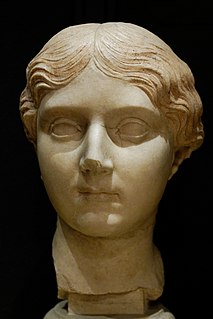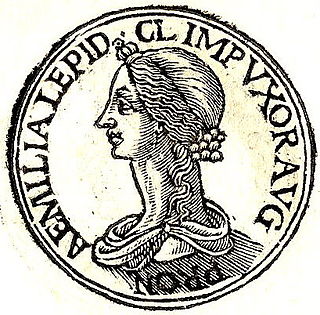
Antonia the Elder was a niece of the first Roman emperor Augustus, being the eldest daughter of Octavia the Younger and her second husband the Triumvir Mark Antony. She married Lucius Domitius Ahenobarbus and became the maternal grandmother of empress Messalina as well as paternal grandmother of the emperor Nero.
Publius Cornelius Dolabella was a Roman senator active during the Principate. He was consul in AD 10 with Gaius Junius Silanus as his colleague. Dolabella is known for having reconstructed the Arch of Dolabella in Rome in AD 10, together with his co-consul Junius Silanus. Later, Nero used it for his aqueduct to the Caelian Hill.
Marcus Junius Silanus was a Roman senator.
Decimus Junius Silanus Torquatus was a Roman senator who lived during the 1st century.

The gens Junia was one of the most celebrated families of ancient Rome. The gens may originally have been patrician, and was already prominent in the last days of the Roman monarchy. Lucius Junius Brutus was the nephew of Lucius Tarquinius Superbus, the seventh and last King of Rome, and on the expulsion of Tarquin in 509 BC, he became one of the first consuls of the Roman Republic.
Mamercus Aemilius Scaurus was a Roman rhetorician, poet and senator. Tacitus writes that Scaurus was "a man of distinguished rank and ability as an advocate, but of infamous life." He was suffect consul from July to the end of the year AD 21, with Gnaeus Tremellius as his colleague.
Appuleia Varilla was a Roman noblewoman and the daughter of Quinctilla Varilla and Sextus Appuleius. She was a grand-niece of the emperor Augustus as her father was the son of Octavia Major.
Marcus Atius Balbus was a 1st-century BC Roman who served as a praetor in 62 BC, he was a cousin of the general Pompey on his mother's side and a brother-in-law of the Dictator Julius Caesar through his marriage to Caesar's sister Julia Minor. Through Julia he became the maternal grandfather of Augustus the first Roman Emperor.
Appius Junius Silanus, whom Cassius Dio calls Gaius Appius Silanus, was consul in AD 28, with Publius Silius Nerva as his colleague. He was accused of majestas, or treason, in AD 32 along with a number of senators, but he and Gaius Calvisius Sabinus were saved by one of the informers, Celsus, a tribune of a city cohort.

Julia was the second of two daughters of Gaius Julius Caesar and Aurelia. She was an elder sister of the dictator Julius Caesar, and the maternal grandmother of Rome's first emperor Augustus.
Gnaeus Cornelius Lentulus Gaetulicus was a Roman senator and general. He was ordinary consul in the year 26 with Gaius Calvisius Sabinus as his colleague. Gaetulicus was involved in a plot against the emperor Caligula, and following its discovery he was executed.
Marcus Plautius Silvanus was a Roman politician and general active during the Principate. He was consul in 2 BC as the colleague of the emperor Augustus.

Aemilia Lepida was a noble Roman woman and matron. She was the first great-grandchild of the Emperor Augustus.
Quintus Junius Blaesus was a Roman novus homo who lived during the reigns of Augustus and Tiberius. He was the maternal uncle of Lucius Aelius Sejanus, the Praetorian Prefect of Emperor Tiberius.
Marcus Junius C. f. M. n. Silanus was an Ancient Roman senator who became suffect consul in AD 15. His daughter Junia Claudilla was the first wife of Emperor Caligula.
Gaius Calvisius Sabinus was a Roman Senator, who was consul in AD 26 as the colleague of Gnaeus Cornelius Lentulus Gaetulicus. During the reign of Caligula, he was accused of conspiring against the emperor, and took his own life rather than submit to a trial.
Marcus Junius D. f. M. n. Silanus was a Roman senator and consul in 25 BC as the colleague of Gaius Julius Caesar Octavianus, the emperor Augustus.
Marcus Junius Silanus Torquatus was a Roman senator. He was consul in AD 19, with Lucius Norbanus Balbus as his colleague.
Appius Claudius Pulcher was a Roman politician. An early supporter of Augustus, he was elected consul in 38 BC.
Gnaeus Cornelius Lentulus "Augur" was a politician and general of the early Roman Empire during the reign of Augustus, who became consul in 14 BC as the colleague of Marcus Licinius Crassus Frugi. Enormously wealthy, he reputedly was forced by emperor Tiberius to commit suicide in 25 AD.